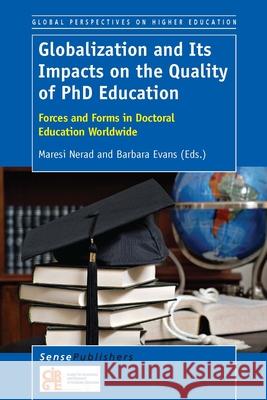Globalization and Its Impacts on the Quality of PhD Education » książka
Globalization and Its Impacts on the Quality of PhD Education
ISBN-13: 9789462095687 / Angielski / Twarda / 2014 / 250 str.
Globalization and Its Impacts on the Quality of PhD Education
ISBN-13: 9789462095687 / Angielski / Twarda / 2014 / 250 str.
(netto: 420,89 VAT: 5%)
Najniższa cena z 30 dni: 425,63
ok. 30 dni roboczych.
Darmowa dostawa!
This book, the second in the projected three-volume Forces and Forms in Doctoral Education Worldwide series sponsored by the Center for Innovation in Graduate Education (CIRGE) at the University of Washington, invites readers to listen in as nearly thirty distinguished scholars and thought leaders confront urgent questions about doctoral education in a globalizing world: How are research doctoral education and the research PhD degree evolving in different national contexts? How do researchers in the early stage of their careers assess the value of doctoral education? What are the challenges of using international demographic data from existing PhD programs to analyze trends in doctoral education? What can happen when regional issues intersect with the need to evaluate doctoral education and ensure its quality? Which quality-assurance model has been gaining favor in PhD education, and what challenges does it pose? What accounts for conflict between national interests and international collaboration in doctoral education? Is there empirical evidence of globalization's impact on doctoral education and the labor market for PhD graduates? This follow-up to Toward a Global PhD? (University of Washington Press, 2008), the first volume in the series, includes case studies illustrating global trends in the structure, function, and quality frameworks of doctoral education, and it develops a conceptual framework linking globalization to trends in doctoral education while showing the particular history that has led to the convergence of a number of practices in one or more countries."
This book, the second in the projected three-volume Forces and Forms in Doctoral Education Worldwide series sponsored by the Center for Innovation in Graduate Education (CIRGE) at the University of Washington, invites readers to listen in as nearly thirty distinguished scholars and thought leaders confront urgent questions about doctoral education in a globalizing world:• How are research doctoral education and the research PhD degree evolving in different national contexts?• How do researchers in the early stage of their careers assess the value of doctoral education?• What are the challenges of using international demographic data from existing PhD programs to analyze trends in doctoral education?• What can happen when regional issues intersect with the need to evaluate doctoral education and ensure its quality?• Which quality-assurance model has been gaining favor in PhD education, and what challenges does it pose?• What accounts for conflict between national interests and international collaboration in doctoral education?• Is there empirical evidence of globalizations impact on doctoral education and the labor market for PhD graduates?This follow-up to Toward a Global PhD? (University of Washington Press, 2008), the first volume in the series, includes case studies illustrating global trends in the structure, function, and quality frameworks of doctoral education, and it develops a conceptual framework linking globalization to trends in doctoral education while showing the particular history that has led to the convergence of a number of practices in one or more countries.











